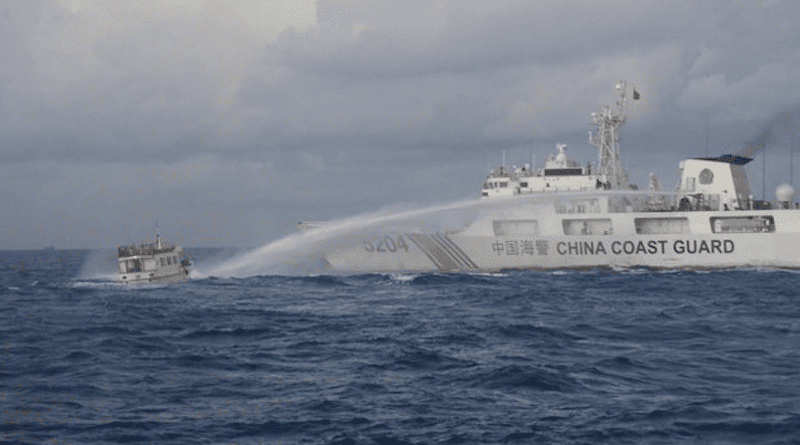Philippines, US, Australia And Japan Hold Naval Drills In South China Sea
By BenarNews
The Philippines, the United States, Australia and Japan are holding a joint naval and air exercise in the South China Sea on Sunday, amid growing tensions fueled by China’s ongoing aggressive conduct in waters internationally recognized as Manila’s territory.
In a joint statement released Saturday, the four nations’ defense chiefs said the “Maritime Cooperative Activity” would take place inside the Philippines’ 200-mile exclusive economic zone and adhere to international conventions on the right of freedom of sea and air navigation.
“Demonstrating our collective commitment to strengthen regional and international cooperation in support of a free and open Indo-Pacific, our combined defense/armed forces will conduct a Maritime Cooperative Activity within the Philippine Exclusive Economic Zone,” it said.
The maneuvers, to be joined by the USS Mobile, Japan’s JS Akebono and Australia’s HMAS Warramunga, come on the heels of China’s recent harassment of Filipino boats delivering supplies to troops stationed at Second Thomas Shoal, locally known as Ayungin Shoal.
The drills were part of “building our country’s capacity for individual and collective self-defense,” Filipino defense chief Gilberto Teodoro Jr. said.
His Japanese counterpart, Kihara Minoru, said the drills were aimed at securing a peaceful region. “Japan believes that the issue concerning the South China Sea is directly related to the peace and stability of the region and is a legitimate concern of the international community,” Minoru said.
Tokyo also “opposes any unilateral changes to the status quo by force,” he said.
The five-ship multinational fleet will sail together from south to north in an exercise “designed to enhance the participating forces’ ability to work together effectively in maritime scenarios,” Filipino defense department spokesman Arsenio Andolong said.
Philippine vessels the BRP Gregorio del Pilar and the BRP Ramon Alcaraz will join the other three in communication exercises, division tactics and watch maneuver drills, he said.
The activity “should not” increase the tension with China in the West Philippine Sea, but “we expect China to malign the exercise as they always do,” Andolong said.
China had no immediate comments on the drills when contacted by Manila-based reporters on Saturday.
The joint operations are taking place ahead of a first-ever U.S.-Japan-Philippines leaders’ summit at the White House on April 11 that is expected to announce Japan’s participation in trilateral naval patrols in the South China Sea.
In late March, Manila strongly protested after Chinese water cannon blasts hurt three Filipino crew members and caused “significant damages” to a vessel attempting to resupply troops stationed at Second Thomas Shoal.
And in the latest maritime encounter, Manila said two Chinese coast guard vessels had “harassed” Filipino fishing vessels on Saturday, while China’s coast guard said those ships had “illegally” entered waters that Beijing has sovereignty over, according to Reuters.
In a statement on Sunday’s joint drills, U.S. Secretary of Defense Lloyd Austin said every country should be free to conduct lawful air and maritime operations.
“These activities with our allies Australia, Japan, and the Philippines underscore our shared commitment to ensuring that all countries are free to fly, sail, and operate wherever international law allows,” Austin said.
Citing historical grounds, China claims nearly the entire South China Sea, including Second Thomas Shoal that is within the Philippines’ exclusive economic zone. Vietnam, Brunei, Malaysia and Taiwan also have territorial claims to the sea.
A 2016 ruling by the Permanent Court of Arbitration in The Hague dismissed China’s sweeping historical claims to the waterway, but Beijing has refused to acknowledge the ruling.
Jeoffrey Maitem and Mark Navales contributed to this report.

